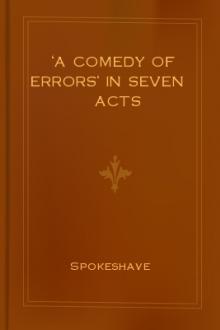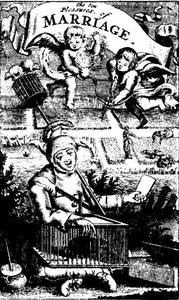A Wodehouse Miscellany: Articles & Stories by P. G. Wodehouse (websites to read books for free .txt) 📗

- Author: P. G. Wodehouse
Book online «A Wodehouse Miscellany: Articles & Stories by P. G. Wodehouse (websites to read books for free .txt) 📗». Author P. G. Wodehouse
All authorities agree that the first hole on every links should be moderately easy, in order to give the nervous player a temporary and fictitious confidence.
At Wodehouse Manor, therefore, we drive off from the front door—in order to get the benefit of the door-mat—down an entry fairway, carpeted with rugs and without traps. The hole—a loving-cup—is just under the stairs; and a good player ought to have no difficulty in doing it in two.
The second hole, a short and simple one, takes you into the telephone booth. Trouble begins with the third, a long dog-leg hole through the kitchen into the dining-room. This hole is well trapped with table-legs, kitchen utensils, and a moving hazard in the person of Clarence the cat, who is generally wandering about the fairway. The hole is under the glass-and-china cupboard, where you are liable to be bunkered if you loft your approach-shot excessively.
The fourth and fifth holes call for no comment. They are without traps, the only danger being that you may lose a stroke through hitting the maid if she happens to be coming down the back stairs while you are taking a mashie-shot. This is a penalty under the local rule.
The sixth is the indispensable water-hole. It is short, but tricky. Teeing off from just outside the bathroom door, you have to loft the ball over the side of the bath, holing out in the little vent pipe, at the end where the water runs out.
The seventh is the longest hole on the course. Starting at the entrance of the best bedroom, a full drive takes you to the head of the stairs, whence you will need at least two more strokes to put you dead on the pin in the drawing-room. In the drawing-room the fairway is trapped with photograph frames—with glass, complete—these serving as casual water: and anyone who can hole out on the piano in five or under is a player of class. Bogey is six, and I have known even such a capable exponent of the game as my Uncle Reginald, who is plus two on his home links on Park Avenue, to take twenty-seven at the hole. But on that occasion he had the misfortune to be bunkered in a photograph of my Aunt Clara and took no fewer than eleven strokes with his niblick to extricate himself from it.
The eighth and ninth holes are straightforward, and can be done in two and three respectively, provided you swing easily and avoid the canary's cage. Once trapped there, it is better to give up the hole without further effort. It is almost impossible to get out in less than fifty-six, and after you have taken about thirty the bird gets visibly annoyed.
THE ALARMING SPREAD OF POETRY
To the thinking man there are few things more disturbing than the realization that we are becoming a nation of minor poets. In the good old days poets were for the most part confined to garrets, which they left only for the purpose of being ejected from the offices of magazines and papers to which they attempted to sell their wares. Nobody ever thought of reading a book of poems unless accompanied by a guarantee from the publisher that the author had been dead at least a hundred years. Poetry, like wine, certain brands of cheese, and public buildings, was rightly considered to improve with age; and no connoisseur could have dreamed of filling himself with raw, indigestible verse, warm from the maker.
Today, however, editors are paying real money for poetry; publishers are making a profit on books of verse; and many a young man who, had he been born earlier, would have sustained life on a crust of bread, is now sending for the manager to find out how the restaurant dares try to sell a fellow champagne like this as genuine Pommery Brut. Naturally this is having a marked effect on the life of the community. Our children grow to adolescence with the feeling that they can become poets instead of working. Many an embryo bill clerk has been ruined by the heady knowledge that poems are paid for at the rate of a dollar a line. All over the country promising young plasterers and rising young motormen are throwing up steady jobs in order to devote themselves to the new profession. On a sunny afternoon down in Washington Square one's progress is positively impeded by the swarms of young poets brought out by the warm weather. It is a horrible sight to see those unfortunate youths, who ought to be sitting happily at desks writing "Dear Sir, Your favor of the tenth inst. duly received and contents noted. In reply we beg to state...." wandering about with their fingers in their hair and their features distorted with the agony of composition, as they try to find rhymes to "cosmic" and "symbolism."
And, as if matters were not bad enough already, along comes Mr. Edgar Lee Masters and invents vers libre. It is too early yet to judge the full effects of this man's horrid discovery, but there is no doubt that he has taken the lid off and unleashed forces over which none can have any control. All those decent restrictions which used to check poets have vanished, and who shall say what will be the outcome?
Until Mr. Masters came on the scene there was just one thing which, like a salient fortress in the midst of an enemy's advancing army, acted as a barrier to the youth of the country. When one's son came to one and said, "Father, I shall not be able to fulfill your dearest wish and start work in the fertilizer department. I have decided to become a poet," although one could no longer frighten him from his purpose by talking of garrets and starvation, there was still one weapon left. "What about the rhymes, Willie?" you replied, and the eager light died out of the boy's face, as he perceived the catch in what he had taken for a good thing. You pressed your advantage. "Think of having to spend your life making one line rhyme with another! Think of the bleak future, when you have used up 'moon' and 'June,' 'love' and 'dove,' 'May' and 'gay'! Think of the moment when you have ended the last line but one of your poem with 'windows' or 'warmth' and have to buckle to, trying to make the thing couple up in accordance with the rules! What then, Willie?"
Next day a new hand had signed on in the fertilizer department.
But now all that has changed. Not only are rhymes no longer necessary, but editors positively prefer them left out. If Longfellow had been writing today he would have had to revise "The Village Blacksmith" if he wanted to pull in that dollar a line. No editor would print stuff like:
Under the spreading chestnut tree The village smithy stands. The smith a brawny man is he With large and sinewy hands.If Longfellow were living in these hyphenated, free and versy days, he would find himself compelled to take his pen in hand and dictate as follows:
In life I was the village smith, I worked all day But I retained the delicacy of my complexion Because I worked in the shade of the chestnut tree Instead of in the sun Like Nicholas Blodgett, the expressman. I was large and strong Because I went in for physical culture And deep breathing And all those stunts. I had the biggest biceps




Comments (0)